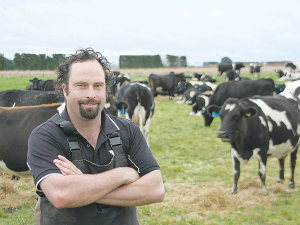Farmers have expressed alarm at some banks setting targets to reduce emissions at a time when the sector is under growing financial strain.
Federated Farmers is warning that if banks push emissions targets onto farmers, they would be taking their business elsewhere.
Financed emissions are the greenhouse gas (GHG) emissions linked to the investing and lending activities of financial institutions. They are coming under more pressure to measure and disclose financed emissions as regulators assess climate risks.
BNZ says its dairy emissions reduction target is an 11% reduction in financed biological emissions intensity (kgCO2e / kgMS) by 2030 against a 2022 baseline.
The bank says having a climate resilient, efficient dairy sector is key to New Zealand's future success. BNZ plans to publish "a high-level transition plan" for the sector by April next year.
Federated Farmers executive recently met the bank to raise concerns about the target. Feds dairy section chair Richard McIntyre told Rural News that while the bank recognised the announcement was poorly timed, it stood by the targets.
"To come out with something like this while dairy farmers are in the middle of calving and under huge pressure financially seems completely out of touch with where customers heads are at," he says.
"Farmers are focused on keeping their head above water and ensuring they have viable businesses, and I would have hoped BNZ would have been focused on the same thing - supporting farmers through a difficult period, not adding more complexity, cost, and compliance."
McIntyre questioned why the banks felt the need to push for climate change targets.
“We already have government-imposed emission targets, and processors like Fonterra are going to be releasing their scope 3 emissions targets sometime soon,” he told Rural News.
“I do wonder if they’re just making a pledge that they think somebody else is going to have to enforce, and if they would be doing this if it was something they were going to have to drive themselves. If that is the case then it just sounds like greenwashing to me.”
McIntyre says if the BNZ wants to push climate targets onto farmers, that’s up to them.
“But farmers have choices too, and some may choose to take their business elsewhere.”
BNZ’s general manager agribusiness Dave Handley told Rural News that the work to tackle emissions requires a collaborative approach.
“Like all responsible businesses we are working closely with our customers as we all work towards the Government’s target of net zero carbon by 2050,” he explained.
“In line with the Zero Carbon Act, and as required by incoming mandatory climate disclosure rules, BNZ has begun setting and disclosing decarbonisation targets. We published our first set of targets in May, covering a range of industries including dairy. Further targets for sectors such as real estate, transport, and sheep and beef will be published next year.”
Handley noted that while legislation sets the framework, the type of target varies and can be an absolute emissions reduction target or a physical intensity emissions target.
He points out that BNZ’s dairy target specifically focuses on emissions intensity associated with each kgMS produced, not absolute reductions.
“Recognising the dairy sector’s crucial role in New Zealand’s economy, our aim is to encourage growth in the sector by aiding it to become more efficient and sustainable, producing more with fewer emissions.”
Not all New Zealand banks have set targets for the agri sector.
A spokesperson for ANZ says supporting farmers with their sustainability goals has been a key focus for us for several years.
“As the country’s main bank for more than 34% of farmers, we are very aware of the changeable landscape our farming customers face. We work closely with them to understand their specific challenges.
“We have not set financed emissions targets in NZ for agri.”
Who's Behind This?
BNZ signed up to the Net Zero Banking Alliance (NZBA) in October 2021.
It is obliged to publish a first round of emissions reduction targets for priority sectors including dairy.
The industry-led, United Nations convened NZBA is a group of banks aiming to transition their lending and investment portfolios to net-zero emissions by 2050. It has 133 bank members from 43 countries holding a combined US$74 trillion in total assets. Membership of the NZBA comes with emissions reduction targets.
ANZ’S parent company ANZ Group Holdings is also a member of NZBA.



















